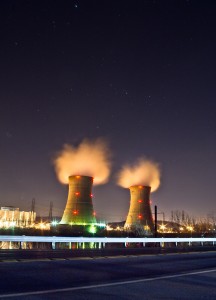
Three Mile Island power plant.
Joanne Cassaro / WITF


Three Mile Island power plant.
Joanne Cassaro / WITF

Joanne Cassaro / WITF
Three Mile Island power plant.

Joe Ulrich / WITF
Three Mile Island was the most serious accident in U.S. commercial nuclear power plant operating history.
Update: March 28, 2019 marks the 40th anniversary of the partial meltdown at the Three Mile Island nuclear power plant. View multimedia coverage of the accident, its impact and the future of TMI and the nuclear industry, and read personal stories of people who lived through that tense time.
Today marks the 35th anniversary of the worst nuclear accident in U.S. history. On March 28th, 1979 one of the reactors at the The Three Mile Island nuclear power plant in Dauphin County partially melted down.
Back then, no one knew exactly what was going to happen. The incident was unprecedented.
Former Governor Dick Thornburgh was at the center of the crisis. He marked the anniversary at an event Thursday at Penn State’s Harrisburg campus in Middletown–not far from the plant.
Thornburgh remains troubled the country still has no long-term plan to handle its nuclear waste.
“The solution to the problem of nuclear waste has to be at the top of anybody’s to-do list, when it comes to ensuring we’re going to have a vital nuclear energy industry that can contribute to our further economic growth,” he says.
Former Middletown Mayor Robert Reid was also in the thick of the emergency response. He’s spent decades living in the shadow of the plant’s massive cooling towers.
Reid had just been elected when the accident happened. Like many people at the time, he had trouble getting credible information about the threat it posed.
“Back, 35 years ago, I was well… anti-nuclear,” he says. “But with the operation of the plant now, by this company– I think it’s a good neighbor. I’ve changed my mind about nuclear energy.”
The plant’s still operational Unit 1 reactor is now owned by Exelon, while the mothballed Unit 2 reactor is owned by FirstEnergy.
In the years since the accident, no new plants have been commissioned in the United States, and regulatory oversight has increased, according to Neil Sheehan a spokesman for the U.S. Nuclear Regulatory Commission.
“This did have significant impacts across the US nuclear power industry and for nuclear power plants around the world.”
The decommissioning of the plant and restoration of the site is still decades away.
The license for the Unit 1 reactor expires in 20 years. At that point, both reactors will be dismantled together, over a 10 year period. Plans call for a full restoration of the site by 2054 — 75 years after the accident.
“Thirty-five years later, we’re a bookmark,” says Eric Epstein, of the nuclear watchdog group, Three Mile Island Alert. “Chernobyl happened, then Fukushima happened. Unfortunately we’re part of an exclusive club that has experienced a nuclear catastrophe.”
He says since there is currently nowhere to take the waste, it has be indefinitely entombed on the island in the middle of the Susquehanna River and he’s not hopeful it will be removed this century.
“This is an inter-generational problem for people who have yet to be born, and that’s not fair,” he says.
“I think as adults we have to come to grips with the fact that we’ve created a hazardous waste site and we’ll have to guard it—isolate it—for hundreds, if not thousands of years.”
The decommissioning plans were outlined in a report that was submitted last summer to the NRC. Although the agency isn’t required to give an official approval, it’s still reviewing the proposal.
StateImpact Pennsylvania is a collaboration among WITF, WHYY, and the Allegheny Front. Reporters Reid Frazier, Rachel McDevitt and Susan Phillips cover the commonwealth’s energy economy. Read their reports on this site, and hear them on public radio stations across Pennsylvania.
(listed by story count)
StateImpact Pennsylvania is a collaboration among WITF, WHYY, and the Allegheny Front. Reporters Reid Frazier, Rachel McDevitt and Susan Phillips cover the commonwealth’s energy economy. Read their reports on this site, and hear them on public radio stations across Pennsylvania.
Climate Solutions, a collaboration of news organizations, educational institutions and a theater company, uses engagement, education and storytelling to help central Pennsylvanians toward climate change literacy, resilience and adaptation. Our work will amplify how people are finding solutions to the challenges presented by a warming world.